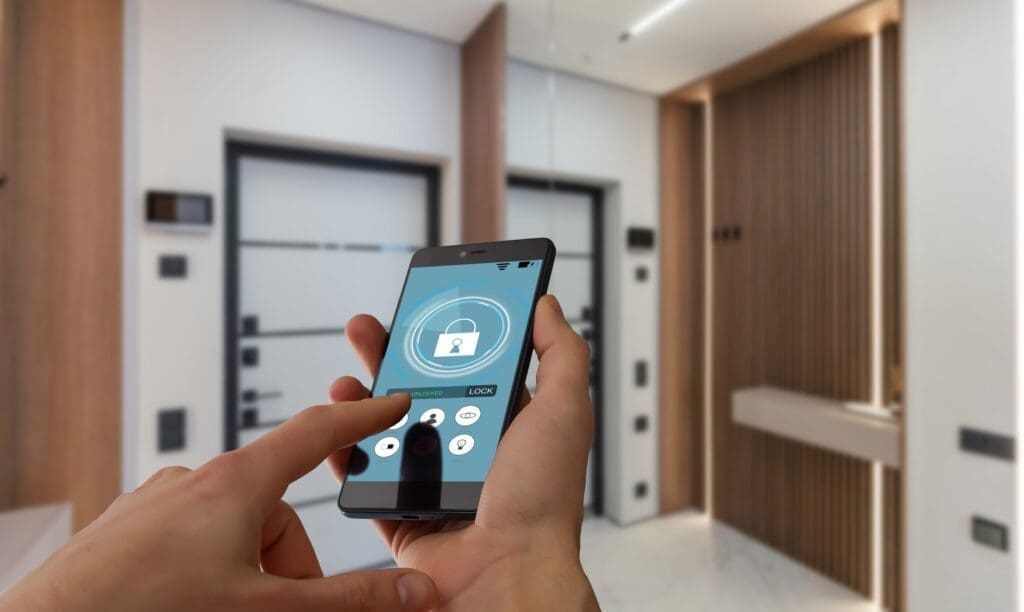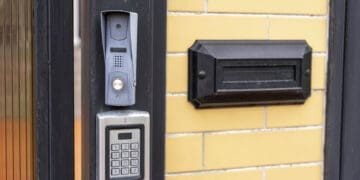In the evolving landscape of home and business security, choosing the right protection for doors has become a crucial decision. With the advent of smart locks and access control systems, the traditional key has been gradually replaced by more sophisticated, electronically managed solutions.
These advancements not only enhance security but also offer unprecedented convenience and customization options. From keyless entry facilitated by deadbolt locks that integrate seamlessly with google assistant, amazon alexa, or apple home, to sophisticated access control systems allowing granular access configurations and remote control, the choices are vast and varied.
The importance of making an informed decision cannot be overstated, as the right system can significantly contribute to the safety and efficiency of both residential and commercial environments.
This article delves into the intricacies of smart locks, covering everything from smart door locks to their integration with smart home systems, and contrasts them with the complexities and capabilities of access control systems. It aims to provide a comprehensive understanding of which solution might be better suited for home use, highlighting aspects such as ease of use, security, and smart home integration.
Similarly, it will explore which system is more efficient for business applications, considering the need for robust security and the ability to control access across multiple entries remotely.
By the conclusion, readers should have a clear insight into whether smart locks or access control systems offer the best solution for their specific needs, backed by an informed discussion on key features such as security level, integration capabilities, and overall convenience.
Smart Locks: What You Need to Know

Smart locks offer a range of benefits that enhance both security and convenience for homeowners. Unlike traditional locks, they eliminate the need for physical keys, allowing you to control access to your home using virtual keys, mobile apps, or access codes .
Security
Smart locks prioritize security by incorporating advanced features that traditional locks lack. Many smart locks come with ANSI/BHMA certifications, which ensure they meet rigorous standards for strength and resistance against forced entry .
Additionally, some smart locks offer two-factor authentication, requiring a combination of an access code and an additional form of identification, such as a fingerprint or mobile app approval, significantly reducing the risk of unauthorized access .
Smart locks also provide enhanced monitoring capabilities. They can send notifications to your smartphone or a central hub whenever the door is locked, unlocked, or accessed, allowing you to keep track of who enters and exits your home.
Furthermore, integrating smart locks with security cameras can provide an extra layer of protection, enabling you to visually monitor your entryway and surroundings .
Convenience
One of the primary advantages of smart locks is the convenience they offer. With the ability to control your door remotely using a mobile app or virtual keys, you can grant access to family members, friends, or service providers even when you’re away from home . This eliminates the need for hiding spare keys or worrying about lost or stolen physical keys.
Smart locks also offer features like auto-locking and auto-unlocking, which can automatically secure your door after a specified time or when certain conditions are met, such as arming your security system . This removes the hassle of manually locking and unlocking your door, providing peace of mind that your home is secure.
Additionally, smart locks often integrate seamlessly with other smart home systems, allowing you to control your door using voice commands through virtual assistants like Amazon Alexa or Google Assistant . This hands-free operation adds an extra layer of convenience, especially when carrying groceries or managing multiple tasks.
In summary, smart locks combine advanced security features with unparalleled convenience, offering homeowners a modern and efficient solution for managing access to their homes. By eliminating the need for physical keys, providing remote access control, and integrating with smart home systems, smart locks enhance both safety and ease of use.
Access Control Systems: What You Need to Know

Access control systems are a crucial component of information technology (IT) and cybersecurity, regulating who or what can access a particular resource in a computing environment . The primary goal is to minimize security risks by ensuring only authorized users, systems, or services have access to the resources they need .
Access control is not just about allowing or denying access; it involves identifying an individual or system, authenticating their identity, authorizing them to access the resource, and auditing their access patterns . This process minimizes the risk of unauthorized access, protecting sensitive information and systems.
Security
Access control is a proactive security measure that helps deter, detect, and prevent unauthorized access . By controlling who or what has access to a resource, it ensures that only those with the necessary permissions can access the data or service, significantly reducing the risk of a security breach, both from external attackers and insider threats .
Moreover, access control is crucial for compliance with various regulatory requirements, such as the General Data Protection Regulation (GDPR) and the Health Insurance Portability and Accountability Act (HIPAA), which require organizations to implement stringent access control measures to protect personal data . Non-compliance can result in severe penalties and reputational damage.
Access control systems prioritize security by incorporating advanced features like multi-factor authentication, continuous verification, and encryption measures . These systems aid in detecting and preventing fraud by implementing robust authentication methods based on the principle of least privilege .
Convenience
While the primary purpose of access control systems is to enhance security, their positive impact extends beyond protection and into the realm of business operations and employee productivity . Modern access control solutions leverage digital technologies to automate processes, offering convenient and flexible access management .
With features such as centralized control, remote access management, and audit trails, businesses can efficiently manage access rights, track user activity, and generate detailed reports . This improves operational efficiency, reduces administrative burdens, and allows businesses to focus on their core competencies.
Additionally, access control systems simplify the process of accessing critical resources, such as files, databases, and applications, by providing seamless and secure access to authorized resources . With single sign-on (SSO) capabilities, employees can log in once and gain access to all their requisite systems, eliminating the need for repetitive logins and reducing time wastage .
Which is Better for Home Use?

For home use, smart locks offer several advantages over traditional access control systems, making them a more suitable choice for most residential settings.
Smart Locks
Smart locks are designed specifically for homes and small offices where access control is relatively straightforward, involving only a few doors and a limited number of users . They provide a convenient solution for homeowners, eliminating the need to carry physical keys and enabling remote access control through mobile apps or virtual keys .
One of the key benefits of smart locks is their ease of use and integration with smart home systems . With the ability to control the lock using voice commands through virtual assistants like Amazon Alexa or Google Assistant, smart locks offer a hands-free experience that enhances convenience . Additionally, many smart locks can automatically lock or unlock based on certain conditions, such as arming a security system or your proximity to the door .
Smart locks prioritize security by incorporating advanced features like two-factor authentication, encryption, and built-in backup systems . They are harder to pick than traditional locks and often come with ANSI/BHMA certifications, ensuring they meet rigorous standards for strength and resistance against forced entry .
Furthermore, smart locks provide enhanced monitoring capabilities, sending notifications to your smartphone whenever the door is locked, unlocked, or accessed . This allows homeowners to keep track of who enters and exits their home, providing an additional layer of security.
Access Control
While access control systems are designed primarily for commercial environments, they may not be the most practical solution for home use . These systems are typically more complex and expensive than smart locks, offering features that may not be necessary for most residential settings.
Access control systems excel in managing access for multiple doors and a large number of users, which is often not a requirement in a home environment . They are better suited for commercial environments where robust security and centralized access management are essential.
However, it’s important to note that some homeowners may prefer the added security and control offered by access control systems, especially in larger residential properties or homes with multiple entry points . In such cases, a comprehensive access control system can provide granular access configurations, detailed logs, and remote access management capabilities .
In summary, for most homeowners, smart locks offer a more convenient, user-friendly, and cost-effective solution for managing access to their homes. They strike a balance between security and ease of use, integrating seamlessly with smart home systems and providing remote access control capabilities. However, for larger residential properties or homes with specific security requirements, an access control system may be a more suitable choice, offering advanced features and centralized access management.
Which is Better for Business Use?

For business use, access control systems offer a more comprehensive and robust solution compared to smart locks. While smart locks can be suitable for small businesses or specific use cases, access control systems are better equipped to handle the complex security and access management needs of larger commercial environments.
Access Control
Access control systems are designed to provide centralized management and control over who can access various areas within a building or facility. They offer several advantages for businesses:
- Scalability: Access control systems can easily accommodate a large number of users, multiple entry points, and varying access levels . This scalability makes them well-suited for businesses with numerous employees, visitors, and contractors requiring different access permissions.
- Centralized Management: Administrators can manage access rights, monitor activity, and generate detailed reports from a central dashboard or control portal . This centralized approach streamlines the process of granting, revoking, or modifying access permissions for individuals or groups.
- Advanced Security Features: Access control systems incorporate robust security features such as multi-factor authentication, continuous verification, and encryption measures . These features help detect and prevent unauthorized access, ensuring the safety of sensitive areas and assets.
- Integration Capabilities: Modern access control systems can integrate with other security systems, such as video surveillance, intrusion detection, and alarm systems . This integration provides a comprehensive security solution, enabling businesses to monitor and respond to potential threats more effectively.
- Compliance and Auditing: Access control systems aid in compliance with various regulatory requirements, such as HIPAA and GDPR, by providing detailed audit trails and restricting access to sensitive data and areas . These audit trails can be invaluable in investigating security incidents or demonstrating compliance during audits.
- Remote Access Management: Administrators can manage access permissions remotely, adjusting access times, dates, and credentials as needed . This flexibility allows businesses to respond quickly to changing security requirements or personnel changes.
- Automation and Efficiency: Access control systems can automate processes such as unlocking doors during specific times or granting temporary access to visitors or contractors . This automation reduces administrative burdens and improves operational efficiency.
Smart Locks
While smart locks offer convenience and basic access control features, they may not be the most suitable choice for businesses with complex security requirements or multiple entry points:
- Limited Scalability: Smart locks are typically designed for residential or small-scale commercial use, with a limited number of users and access points . As a business grows, managing access across multiple smart locks can become cumbersome and inefficient.
- Decentralized Management: Each smart lock operates independently, requiring individual management and configuration . This decentralized approach can make it challenging to maintain consistent access policies and monitor activity across multiple locations.
- Basic Security Features: While smart locks incorporate some security features like access codes or mobile app integration, they may lack advanced capabilities such as multi-factor authentication or integration with other security systems .
- Limited Integration: Most smart locks are designed to integrate with smart home platforms rather than commercial access control systems . This lack of integration can hinder businesses from leveraging existing security infrastructure or implementing comprehensive access management strategies.
- Offline Functionality: Some smart locks may have limited offline functionality, potentially causing disruptions or security vulnerabilities in the event of power outages or network issues .
While smart locks can be a cost-effective solution for small businesses or specific use cases, such as low-traffic areas or doors that do not require high-level security, access control systems offer a more robust, scalable, and centralized solution for businesses with complex access management needs.
Conclusion
Through the comprehensive exploration of smart locks and access control systems, this article has illuminated the pivotal aspects and contrasts between the two, catering specifically to either residential or commercial needs.
Smart locks emerge as a cornerstone of convenience and security for home usage, seamlessly integrating with smart home ecosystems and offering user-friendly features like remote access and voice command compatibility.
Conversely, access details about access control systems underscore their indispensability in professional and larger-scale settings, where their ability to manage complex security arrangements and comply with regulatory standards is paramount.
Emphasizing the significance of choosing the appropriate system cannot be overstated; it is a critical decision bearing profound implications on privacy, security, and operational efficiency. For homeowners, smart locks assure peace of mind through enhanced control over home security with their advanced features and ease of use.
On the flip side, businesses benefit from the robust, scalable, and comprehensive security protocols afforded by access control systems, ensuring safeguarded access to sensitive areas and data. In navigating the decision-making process, this article serves as a guide, providing clear insights to inform the choice between smart locks and access control systems, tailored to individual needs and circumstances.
FAQs
What are some drawbacks of using smart locks?
Some of the notable disadvantages of smart locks include their vulnerability to hacking, as they are not entirely foolproof. Additionally, many smart locks require an internet connection to function optimally. They also depend on batteries which need regular replacement, and generally, they are more costly than traditional key locks.
How do smart locks differ from access control systems?
The primary difference lies in their intended use environments. Smart locks are typically designed for individual doors in residential homes or small offices, accommodating only a handful of users. In contrast, access control systems are suited for larger environments where multiple entry points and user access management are necessary.
Are smart locks a better choice than traditional locks?
The better choice between smart locks and traditional locks depends on your specific needs. If you value the convenience of remote operation and advanced features, smart locks are preferable. However, if you prioritize simplicity and manual operation without the need for electronic components, traditional locks might be more suitable.
Is it easier for intruders to break into smart locks compared to traditional locks?
Contrary to common belief, well-constructed smart locks are generally more challenging to breach than traditional locks. They often require sophisticated techniques to pick, which are beyond the capabilities of most ordinary criminals. Additionally, many smart locks feature a backup system, such as a keypad, enhancing their security further.

















